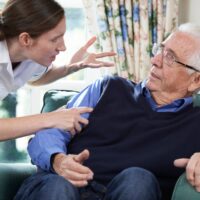What Are the Types of Nursing Home Abuse?

Nursing home abuse and neglect can take many forms. Some are more obvious, while other forms of abuse may be harder to detect. If you recognize any signs of abuse, it is important to act as soon as possible to protect your vulnerable loved one. Get them to a safe space and speak with a nursing home abuse lawyer to help investigate and ensure that your elderly family member is not being abused. Read on for a discussion of several of the different types of nursing home abuse, and contact a seasoned New Jersey nursing home abuse and neglect lawyer for more information.
Physical Abuse
Physical abuse of the elderly is frighteningly common in nursing homes and other long-term care facilities. Abuse can take the form of shaking, choking, scratching, biting, shoving, hitting, or kicking nursing home residents. Physical abuse may come from nursing home staff, other residents, or even strangers on the street; nursing homes have an obligation to protect residents from harm.
If you have a loved one in a nursing home, look out for signs of physical abuse, including:
● Cuts, scrapes, or scratches
● Broken bones
● Muscle tears
● Bite marks
● Redness around the neck or wrists from choking or restraints
● Bruises and black eyes
Verbal and Psychological Abuse
Not all abuse is physical. Nursing home staff may verbally berate residents, belittling them or scaring them. Residents may be forced into isolation as “punishment” for perceived slights or denied meals for alleged rule violations. Residents who suffer from verbal assaults, insults, threats, humiliation, intimidation, or harassment may demonstrate sudden mood changes, fear of nursing staff or people generally, or other signs of psychological distress.
Malnutrition and Dehydration
Nursing homes are responsible for ensuring that residents receive the appropriate nutrition and hydration necessary to stay healthy. Some residents are incapable of eating or drinking on their own; the nursing home is nevertheless responsible for ensuring that they get the food and drink they need to stay fit. If a resident experiences malnutrition or dehydration due to neglect or deliberate abuse by nursing home staff, the nursing home can and should be held liable for any resulting harm.
Sexual Abuse
As abhorrent as it may seem, nursing home residents are at risk for sexual abuse. Sexual abuse includes any unwanted sexual contact of any kind, as well as sexual contact with any person who is incapable of giving consent due to mental incapacity or unconsciousness. Sexual abuse may be perpetrated by staff or other residents and includes any form of unwanted touching, coerced nudity, sexually explicit photographing, and any other form of sexual assault or battery.
Financial or Material Exploitation
Care workers for the elderly must also avoid exploiting elderly or unwell patients for material or financial gain. Illegal exploitation includes any improper use of an elder’s funds, property, or assets, including things like cashing an older adult’s checks without authorization, effecting transfers of wealth, improperly influencing an elderly person to change their will or other financial instruments, coercing or deceiving a person into signing a financial document against their will, or incorrectly using conservatorship, guardianship, or power of attorney.
If you or someone you love has been subject to abuse or negligent care in a New Jersey nursing home, contact the experienced and dedicated Hamilton nursing home negligence attorneys at Lance Brown & Associates at 609-587-5100.

